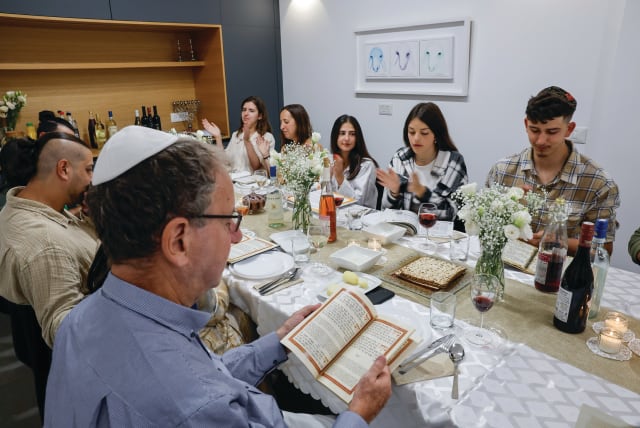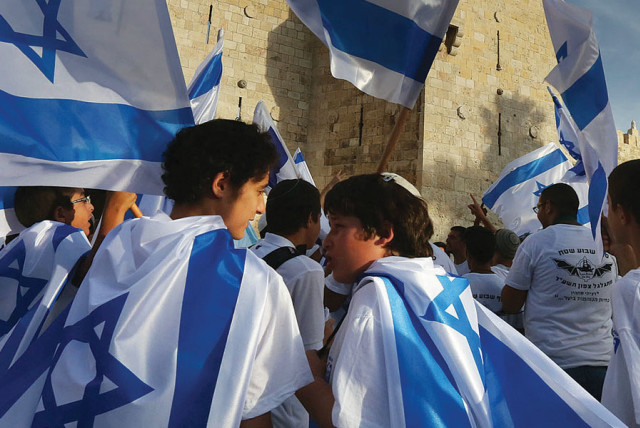This Haggadah can help you have a Zionist Seder this Passover - review

Made by Dr. Marvin Chinitz, this Haggadah is meant to stress the Zionist side of the Haggadah’s narrative.
After the Bible, the Haggadah is the most widely printed book in the Jewish library. To produce a Haggadah with a new message would seem extraordinarily hard, but Dr. Marvin Chinitz believes he has done the impossible. His new Haggadah, called The Chinitz Zion Haggadah, stresses the fact that the real story of the ancient text is about the Jewish people moving into Zion. “But for some reason, this aspect of the story is hardly mentioned in the text,” he said.
“The emphasis,” he explained to The Jerusalem Report, “is on the Exodus leading to the giving of the Torah on Mount Sinai. The rabbis who wrote the Haggadah obviously thought that this was the pinnacle of the story. The Haggadah itself is mainly a product of the Diaspora, so perhaps the rabbi-authors didn’t want to burden their readers by reminding them that they were living outside the land.”
Chinitz, MD, a gastroenterologist at Montefiore Hospital in New York, is a member of a local Conservative synagogue, though he feels comfortable in a more Orthodox setting as well. “I’m not a rabbi,” he said, “but I have accessed much rabbinical knowledge in my 40 years’ quest for this Haggadah! I’ve collected over 100 Haggadot in which serious commentaries are attached. Each time I saw a comment that fit my understanding of what was necessary for a contemporary Haggadah, I noted it in my own ‘master’ Haggadah.”
Now, almost completely retired, he set himself the goal of producing a Haggadah that was appropriate for the times we are living through.
“About three years ago, a rabbi asked me what I was going to do when I retired. I told him, ‘Write a Zionist Haggadah!’ He was very enthusiastic. ‘It’s a great idea,’” he said. “If I needed a one-liner that changed my life, that was it.”
Why make a Zionist Haggadah?
The idea of a Zionist Haggadah did not come about for purely religious reasons. There were very practical reasons, too.
“As we know, Zionism in America is really on the defensive, especially on the campuses,” Chinitz said. “The Jews in America are not doing so well in terms of their relationship to Israel. The rabbi who gave me the incentive for this project sent me back to look at all the Haggadot on my bookcase. In none of them was there anything about Zionism! Maybe this reflects the fact that the classical Haggadah is a product of the Diaspora. It’s a galut book. Part of it is that the rabbis always wanted to stress the leaving of Egypt and the receiving the Torah. I saw that there was no Haggadah stressing the Zionist side of the story of the Exodus. What startled me were the excisions – that someone along the way decided not to emphasize the Zionist dimension of the Haggadah. For example, quotes are taken from the Torah but the settlement of the land is cut off, even though it is in the same sentence!“
According to Chinitz, there is an even greater need to stress the Zionist side of the Haggadah’s narrative today:
“Antisemitism and anti-Zionism have always been there, but they came to the fore in the last two decades or so. People don’t know how to defend Israel. Where do they learn [how to do that]? Not in school. They read articles on the Internet or on social media, or they don’t read anything. So when the leader of the Seder tells those present that they should discuss Israel and Zionism – and that is the place to say it – the challenge is there to take up. I don’t say that Zionism should be an everyday discussion, but certainly at the Seder table. That’s when the family gets together. I’ve appended topics for discussion at the end of my Haggadah. There is a list of some basic facts, not opinions. They can agree or disagree. I’ve also written commentaries in the middle of the book that relate to modern Israel; things that relate to Israel which I pulled out of my head.”
The decision to create a Zionist Haggadah did not come suddenly. It built up over the years and from highly personal experiences. “When my kids were young, they all went to Jewish day school, but they came back not knowing anything about Israel. Day school taught them Hebrew and how to pray. Their secular subjects were mainly the classical stuff – Roman history, etc. When I asked them what they learned about Israel, they said: ‘Nothing.’ So I started by giving them a theme each year – and after a while, they appreciated it. These discussions were not just for my kids. We had 20 to 30 people at our Seder. Each year, we discussed a particular theme. People didn’t like the preparation [for the topic] so much, but they did like the actual discussion at the table. We had enough young adults to ask the questions and discuss the topics. If I had said anything, I would have been shot down; but if my son said something, it was okay. So it worked very well. We covered the gamut of topics – science, philosophy, history, prime ministers, Israeli politics, parties, wars – everything. And we found that they all fitted into the Haggadah.”
Although the publisher – Gefen – holds the rights to the translation from the English commentary, it was thought that it was not yet the time to put out the book in Hebrew; they may well have changed their mind after October 7.
“The situation in Israel today is very complex,” Chinitz said. “So many people have turned against Israel because of what is going on here. But you don’t have to turn against Israel because you dislike the prime minister. There’s a shul in Manhattan where they almost wanted to fire the rabbi because he wanted to put an Israeli flag in the shul. In the yeshiva for women, Maharat, a Zionist lecturer came to speak. Some of the students walked out, and others didn’t even attend. This is true of the Conservative movement, of which I am a member, the same Conservative movement which in 1948 was against the establishment of the State of Israel,” he said.
But things have changed, and Chinitz throws out a challenge to those who still think that Jews and Judaism can survive without Israel or the Zionist component. Chinitz has the same mindset as Micha Goodman in his book on Deuteronomy, where he shows that the biggest challenge is the transformation of a people of slaves into those of masters, and where the individual has to take responsibility for the land and what goes on there.
To which Chinitz added, again quoting the Haggadah, how the patriarch Jacob fights with the angel. “He can’t be meek anymore. If you enter the land, you must know how to fight. I quote the rabbi who says the reason Jacob is given the name Yisrael, which means ‘struggle,’ is because he must know how to fight for himself.”
The Chinitz Zion Haggadah can definitely be a weapon for engaging in this historic fight. ■
Jerusalem Post Store
`; document.getElementById("linkPremium").innerHTML = cont; var divWithLink = document.getElementById("premium-link"); if (divWithLink !== null && divWithLink !== 'undefined') { divWithLink.style.border = "solid 1px #cb0f3e"; divWithLink.style.textAlign = "center"; divWithLink.style.marginBottom = "15px"; divWithLink.style.marginTop = "15px"; divWithLink.style.width = "100%"; divWithLink.style.backgroundColor = "#122952"; divWithLink.style.color = "#ffffff"; divWithLink.style.lineHeight = "1.5"; } } (function (v, i) { });

